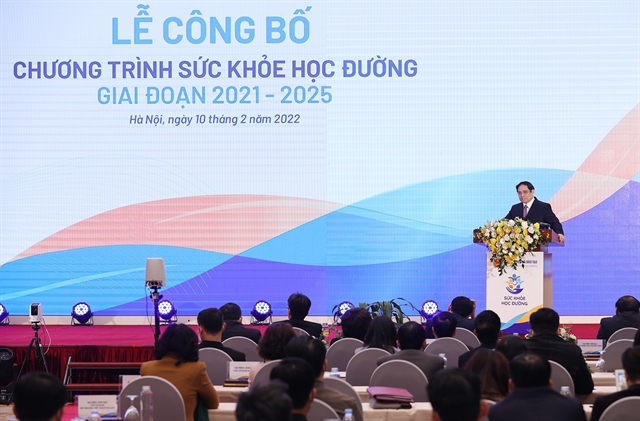 Society
Society

Protecting and caring for nearly 23 million Vietnamese children and students is the responsibility of not only their families but also the community, society and the entire political system, Prime Minister Phạm Minh Chính said on Thursday.

|
| Prime Minister Phạm Minh Chính speaks at the ceremony held on Thursday to announce the national school health programme. — VNA/VNS Photo |
HÀ NỘI — A national programme has been launched to provide better care for nearly 23 million Vietnamese children and students.
Addressing the launch ceremony of the 2021-25 National School Health Programme on Thursday, Prime Minister Phạm Minh Chính said protecting and caring for children and students is the responsibility of not only their families but also the community, society and the entire political system.
It demonstrates the Party and State’s resolve to improve the lives of children and students and ensure the best possible future, the PM said.
The programme focuses on promoting education, care, protection and management of students' health.
It will ensure comprehensive physical and mental development for children at preschools, special education schools, and primary and high schools.
The programme set goals for 80 per cent of schools to have adequate medicine and equipment, and 75 per cent of schools to have enough drinking water and clean water for student activities.
It also sets targets for physical education and sports in schools.
Eighty per cent of schools will have at least one area to ensure necessary equipment and tools for physical education and sports, as prescribed by the Ministry of Culture, Sports and Tourism.
All schools will periodically organise sports competitions; 100 per cent of primary and high schools will have enough qualified physical teachers trained in professional skills.
Targets were set for ensuring proper nutrition for children, including 100 per cent of schools organising lunch at canteens, ensuring hygiene and food safety.
Sixty per cent of schools will have milk and dairy products in standard school meals.
School health education must also be a focus. According to the programme, 100 per cent of students must be educated about health and improve knowledge about disease prevention and mental health.
Students must be taught about proper nutrition, healthy and safe food.
Fifty per cent of high school students must receive information and counselling on mental health and psychology. Education on the care of children will also be expanded to include teachers, students and parents.
The programme also outlines the task to upgrade healthcare facilities and equipment in schools.
Schools need to be equipped with medical equipment and medicine to ensure school healthcare work, meeting the requirements of disease prevention and control especially amid the pandemic.
Schools must install tables and chairs suitable for student height, especially children with disabilities; and build or repair waterworks and sanitation facilities in schools.
The health and education sectors will work to strengthen inspection of school healthcare including food safety, dental care, optical care and first aid.
For disadvantaged, remote and mountainous, and ethnic minority areas, the Government will give priority to the improvement of medical equipment, and school meals.
The quality of school health workers must be improved.
Schools are suggested to arrange full-time or part-time health staff, even if they are not on the school's payroll, to carry out school health work in accordance with the conditions of each locality and school.
Schools need to renovate physical education and school sports activities and encourage the development of swimming, football and ethnic sports suitable for each region.
Funding will come from the State budget and revenue of schools, as well as support from domestic and social organisations and individuals.
The programme was launched as Việt Nam takes steps to reopen schools after closure due to the pandemic.
The pandemic has seriously impacted the physical and mental health of tens of millions of students, both directly and indirectly, PM Chính said, noting that thousands had been orphaned by the pandemic.
He urged ministries, agencies and localities to closely coordinate in implementing the programme, and called for the response of every school, family, student and individual.
"Strong messages should be made, and bold actions are needed as there remain children without care and protection, who face threats to their life and physical and spiritual health," the PM said.
Apart from schools reopening, ministries, agencies and localities will continue with the vaccination rollout for children aged from 5-to 12, safely, suitably and effectively, he said.
The Government welcomes domestic and international organisations, businesses and individuals to play a part in the programme, and other programmes and projects.
The PM said that with the effective management of the State, the engagement of the entire political system, the support of people nationwide as well as international friends, and the response of schools, the National School Health Programme will be rolled out successfully, creating breakthroughs in child protection.
At the ceremony, the Ministry of Education and Training (MoIT) and the Ministry of Health signed a programme on coordination in school health work in 2022-2026. The MoIT and the Ministry of Culture, Sports and Tourism agreed on another coordination programme for the period. VNS




